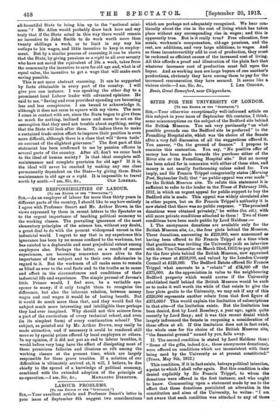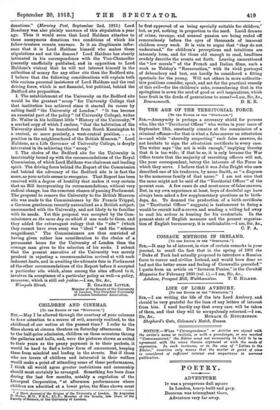SITES FOR THE UNIVERSITY OF LONDON. [To STIR EDITOR OP
THE SPECTATOR."] SIR,—Your otherwise exceptionally well-informed article on this subject in your issue of September 6th contains, I think, some misconceptions on the subject of the Bedford site behind the British Museum. You ask very pertinently " on what possible grounds can the Bedford site be preferred" to the Foundling Hospital site, which was the choice of the Senate after a very full discussion of all the suggestions offered it. You answer, "On the ground of finance." I propose to examine this contention. You say, "No positive offer of money has been made towards the purchase either of the River site or the Foundling Hospital site." But no money has been asked for in connexion with either of these sites, and money is not usually forthcoming unless asked for•. You imply, and Sir Francis Trippel categorically states (Morning Post, September 2nd), that "no public appeal was ever made" for the British Museum site. To refute this statement it is sufficient to refer• to the leader in the Times of February 19th, 1912, in which an urgent appeal for public support to buy the Bedford site is made. This appeal was widely circulated also in other papers, but on Sir Francis Trippel's authority it is now stated that there was no public response. " The promised donations were obtained privately," he writes (lon cit.), with still more private conditions attached to them ! Two of these conditions have been made public by Lord Haldane :- L The anonymous donations are available only for the British Museum site, i.e., the four plots behind the Museum. These donations, amounting to £220,000, were announced as having been offered to Sir Francis Trippel at a time when that gentleman was inviting the University (vide an interview with the Tice-Chancellor on March 22nd, 1912) to pay £375,000 for the four plots behind the British Museum, now appraised by the owner at £218,000, and valued by the London County Council at £125,000. The Bedford Estate offered Sir Francis Trippel what amounts to a "rebate" of £74,000 off the £375,000. As the appreciation in value to the neighbouring Bedford property which would accrue if the University established itself behind the British Museum would be such as to make it well worth the while of that estate to give the four plots gratis to the University, we may ask if any of this £220,000 represents another rebate from that first figure of £375,000 P This would explain the limitation of subscriptions to that site—if the limitation exists. But the limitation has been denied, first by Lord Rosebery, a year ago; again quite recently by Lord Reay; and it was this recent denial which largely influenced the Senate in reopening a consideration of these offers at all. If this limitation does not in fact exist, the whole case for the choice of the British Museum site, "the financial ground" named by you, falls away.
II. The second condition is stated by Lord Haldane thus : " Some of the gifts, indeed (i.e., these anonymous donations), were offered on conditions which are inconsistent with their being used by the University as at present constituted." (Times, May 9th, 1912.) This condition, if it in fact exists, betrays political intention, a point to which I shall refer again. But this condition is also denied explicitly by Sir Francis Trippel, to whom the donations were offered in the first instance, and who ought to know. Commenting upon a statement made by me to the effect that these donations postulated an alteration in the constitution and aims of the University, he writes : "I am not aware that such condition was attached to any of these
donations." (Morning Post, September 2nd, 1913.) Lord Rosebery was also plainly unaware of this stipulation a year ago. Thus it would seem that Lord Haldane attaches to these anonymous donations two conditions of which his fellow-trustees remain unaware. Is it an illegitimate infer- ence that it is Lord Haldane himself who makes these stipulations and not the donors ? Lord Haldane has clearly intimated in his correspondence with the Vice-Chancellor (recently unofficially published, and in opposition to Lord Haldane's wishes) that. be will not interest himself in the collection of money for any other site than the Bedford site. I believe that the following considerations will explain both this curious personal insistence of Lord Haldane and the real driving force, which is not financial, but political, behind the Bedford site proposition.
1. The establishment of the University on the Bedford site would be the greatest " scoop " for University College that that institution has achieved since it started its career by calling itself "the University of London." "It has become an essential part of the policy " (of University College), writes Dr. Waller in his brilliant little " History of the University,"* a marked copy of which I enclose, "that the habitation of the University should be transferred from South Kensington to a central, or more precisely, a west-central position, . . . a position in the neighbourhood of the British Museum." Lord Haldane, as a Life Governor of University College, is deeply interested in its achieving this " scoop."
2. The choice of the Bedford site for the University is inextricably bound up with the recommendations of the Royal. Commission, of which Lord Haldane was chairman and leading spirit. The driving force behind the Report of the Commission and behind the advocacy of the Bedford site is in fact the same, as your article seems to recognize. That Report has been received with a degree of hostility that makes it very certain that no Bill incorporating its recommendations, without very radical change, has the remotest chance of passing Parliament. The proposal to remove the University to the British Museum site was made to the Commissioners by Sir Francis Trippel, a German gentleman recently naturalized as a British subject, unconnected with the University, and not likely to be familiar with its needs. Yet this proposal was accepted by the Com- missioners on the same day on which it was made to them, and they added the extravagant eulogy that the " site " (which they cannot have even seen) was " ideal " and the " scheme magnificent." The Commissioners are thus convicted of having given rather less consideration to the choice of a permanent home for the University of London than the average man gives to the selection of his socks. I submit that the present executive of the University was merely prudent in rejecting a recommendation arrived at with such indecent haste, and in awaiting the ultimate fate in Parliament of the other recommendations of the Report before it accepted a particular site which, alone among the sites offered to it, involves its acceptance of a particular policy as well—a policy, moreover, which is still sub judice.—I am, Sir, &c.,
Member of the Senate of the University of London, Vice-President University of London Graduates' Association.











































 Previous page
Previous page